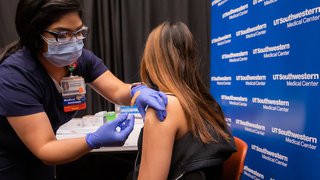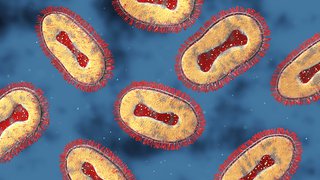Masks are essential; ‘maskne’ is not: How to avoid pandemic skin problems
August 13, 2020

The COVID-19 pandemic has caused many of us to change our daily habits since March. Wearing a mask has become an essential behavior because studies have proven it to be the most effective way to reduce the spread of the novel coronavirus and protect us all.
Wearing a face covering for long periods of time, however, can cause skin reactions ranging from itchiness and rashes to peeling and acne.
The term “maskne” (mask + acne) has taken off on social media, particularly as more people this summer experience skin irritation around the nose, lips, and chin from wearing a mask.
UT Southwestern’s board-certified plastic surgeons can treat these facial flare-ups and other complex skin conditions. We can also suggest effective ways to help prevent or control this side effect of COVID-19 safety protocols.
The science of mask acne
You might have struggled with acne in the past, probably as a teenager, but mask acne is different. Wearing a mask all day bathes your lower face, chin, and lips in moisture and bacteria. Oil and dead skin cells are trapped on the skin’s surface and block your pores, which normally allow the skin to breathe.
This creates an environment for acne breakouts, dermatitis, and rosacea flare-ups. Your skin may become inflamed from the fibers of the mask and the ties that hold it in place. Health care and frontline workers are familiar with this phenomenon, and to a lesser extent so are athletes who wear helmets. The technical term is “acne mechanica,” which describes skin irritation and flare-ups caused by excess heat, pressure, and friction of a fabric or material against the skin.
Some specialists have also suggested that stress from the pandemic may cause your skin physiology to change and can contribute to mask acne.
What you can do to prevent maskne
Since the state’s mandatory mask order has been in place, we’ve seen a steady reduction in daily case counts of COVID-19. UT Southwestern’s forecasting model suggests masks, along with social distancing and other prevention measures, will be key to continuing to flatten the curve in DFW.

Ready for your video call close-up?
Simple procedures focused on the eyes, lips, and neck can help you feel more confident on video calls and in person.
All of which points to the fact that wearing a mask remains essential, but that doesn’t mean you have to deal with mask acne. Here are several effective ways to prevent it:
- Wear a mask or face covering made of 100% cotton, which allows your skin to breathe. We recommend masks that have an antibacterial lining.
- Make sure to wash your mask daily with antibacterial soap and dry it completely.
- Keep multiple masks with you so if you sweat during the day you can put on a fresh mask. Wearing a sweaty mask will breed more acne.
- Use detergent that’s formulated without dyes and fragrances.
- Brush your teeth or use mouthwash to reduce bacteria before you put on your mask.
- Wash your face before putting on your mask, and clean your face several times a day. Using antibacterial cleansing pads during the day will help prevent oil buildup on the skin surface.
- Use a mild moisturizer that is not too thick to help avoid blackheads and acne flare-ups.
- Wait 15 minutes after applying moisturizer or sunscreen before putting on your mask so the product can soak into the skin.
- Gently exfoliate twice a week to remove dead cells from the surface of your skin.
- Avoid wearing makeup on the covered, lower face. Focus on accentuating your eyes.
- Use lip conditioners with a waxy finish (as opposed to a lip gloss) to keep your lips hydrated while wearing a mask.
- If your skin is sensitive, you may want to avoid retinoids, a family of compounds found in everything from prescription acne medication to wrinkle creams. Retinoids may irritate the skin even more under a mask.
How to cope with irritated skin on your face
- Avoid scratching, rubbing, or picking areas of skin on your face that are irritated.
- Use a salicylic or glycolic cleanser and peel pads in the evenings. Both can help exfoliate the top layer of skin and promote healing of acne.
- Apply a small amount of hydrocortisone 1% to red, bumpy, or swollen areas, conservatively, as needed. Too much or too often can thin the skin.
- Get a mild peel (either glycolic, salicylic, or mandelic), and stay home a couple of days to give your face a break from the mask.
- Apply a thin layer of petroleum jelly or other ointment to chapped areas.
- Use a calming moisturizer when needed.
- Get a medical-grade facial and meet with your aesthetician to design a home regimen that addresses your mask-induced skin needs.
- Take off your mask when you can do so safely to give your skin time to breathe.
When to contact a specialist
Most skin problems caused by wearing a mask are manageable by employing some of the techniques detailed above. If you continue to experience breakouts and damage to your skin, or if you are worried about infections, contact a physician.
At UT Southwestern, our board-certified plastic surgeons can provide relief from mask acne or other facial skin conditions you may be encountering during the pandemic. You can request an appointment online or call 469-731-8748.











